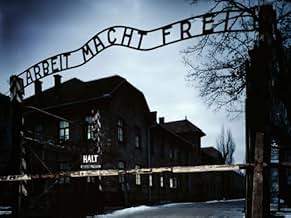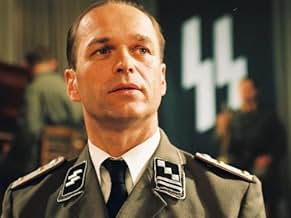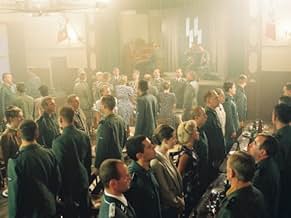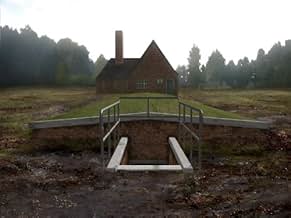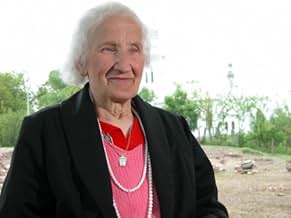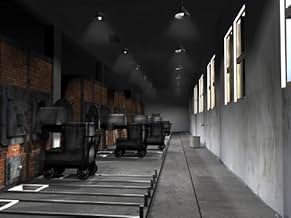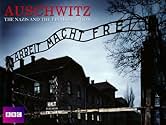Auschwitz: Los nazis y la solución final
Título original: Auschwitz: The Nazis & the 'Final Solution'
- Miniserie de TV
- 2005
- 48min
PUNTUACIÓN EN IMDb
8,6/10
4,7 mil
TU PUNTUACIÓN
Añade un argumento en tu idiomaThe history of the Final Solution phase of the Nazi Holocaust, particularly with the most infamous of the death camps.The history of the Final Solution phase of the Nazi Holocaust, particularly with the most infamous of the death camps.The history of the Final Solution phase of the Nazi Holocaust, particularly with the most infamous of the death camps.
Explorar episodios
Reseñas destacadas
I'm not a Jew so I have no axe to grind.
This is probably the most comprehensive account of the most infamous death-camp of them all. Not only are ex-inmates interviewed, but also ex-SS guards who are extraordinarily candid about their work & their attitude to the prisoners. The whole machinery involved in the organisation & efficiency of what amounted to an entire murder camp system.
This 6 part documentary cannot be ignored, once you have seen the evidence & heard the testimony there will be no doubt in your mind. It did happen & it was done by people not much different from the rest of us.
It cannot be allowed to happen again.
This is probably the most comprehensive account of the most infamous death-camp of them all. Not only are ex-inmates interviewed, but also ex-SS guards who are extraordinarily candid about their work & their attitude to the prisoners. The whole machinery involved in the organisation & efficiency of what amounted to an entire murder camp system.
This 6 part documentary cannot be ignored, once you have seen the evidence & heard the testimony there will be no doubt in your mind. It did happen & it was done by people not much different from the rest of us.
It cannot be allowed to happen again.
TV often fails to convey complex information: both in facts and emotionally; instead it mostly serves up the obvious with images to trick our eyes.
This documentary sets a new standard: the research is impeccable, the interviews gripping, the production perfect in every respect and finally the horror, the terrible horror of what humans can do, is absolutely clear. A history book could not do a better job.
One of the best and bravest aspects of the series is when the interviewers ask a person how they felt about a murder they committed: did they regret it, how do they feel about it now? Those interactions make it worth watching the series alone.
This documentary sets a new standard: the research is impeccable, the interviews gripping, the production perfect in every respect and finally the horror, the terrible horror of what humans can do, is absolutely clear. A history book could not do a better job.
One of the best and bravest aspects of the series is when the interviewers ask a person how they felt about a murder they committed: did they regret it, how do they feel about it now? Those interactions make it worth watching the series alone.
This is the story of the Nazi concentration camp of Auschwitz. We follow it from the very beginning in 1940 until its liberation by Russian troops in January 1945. We also get a glimpse of the aftermath in the form of the Nuremberg trials and we follow the destiny of central figures in the extermination of Jews, Gypsys, Russian POWs and political prisoners from mainly Poland. One of the most unpleasant aspects of this story is that some of the survivors of the camps has lead a miserable life after the war as they were not welcomed by various reasons when they returned home.
The series contains 6 episodes of about 45 minutes each. It is build up by interviews of former prisoners as well as a couple of guards. There is also extensive footage in the form of photography, film-clips and various documents.
In an attempt to make the story come more alive the producers have also hired German actors to play out the role of central figures in Auschwitz; Rudolf Höss, Adolf Eichman, Heinrich Himmler and Dr. Joseph Mengele to name a few. With the help of computer techniques the buildings of Auschwitz has been rebuild in order to get a view of how the camp looked like with specific attention to the gas-chambers and the barracks were the prisoners lived.
So a lot of work has been put into telling the story of one of the darkest chapters in human history. It is truly a depressing tale that leaves you with the big (and unanswered) question: how could this happen? And how can we avoid this happening again? For some reason BBC has chosen not to interview other than eye witnesses and therefore I personally was missing the explanation that a historian, sociologist etc could give to the phenomenon of Holocaust. As a psychologist myself I wondered about this; how can the combination of hatred and discipline be stronger than empathy with the prisoners? Empathy is not something that we choose but something that is always there. So how could those that were involved with the slaughtering of the prisoners not empathize with them? Maybe they did empathize with them after all - but empathy does not always lead to sympathy. It can also lead to sadism I think. Either way, the ability to empathize would dictate that the Germans were not unaffected by their actions which we also are told. Höss never liked the killings and especially in the beginning when it was done by shooting it made him uneasy.
One of the more controversial stories that are being told is that the allied forces refused to bomb the railroad-tracks leading to Auschwitz although they knew what was going on and although they were bombing IG Farben only 6 kilometers away. We have an eyewitness from Auschwitz telling us, that she saw the airplanes from the allied forces flying by and from an air photo of the camp we see that it is easy to identify the crematorium. Why didn't the allied forces drop a few bombs? This is really beyond me and makes me wonder if the allied had some sort of hidden agenda.
Another more controversial story is the story of the Hungarian Jews. The Germans apparently tried to bargain with their lives and wanted trucks in exchange of Jews. In a document from the allied forces we learn that it was seen as "blackmail" and that the allied forces saw a big problem in getting around 700.000 (I think) Jews to house and to feed. So the consequence was that they went straight to Auschwitz and the gas chambers.
Especially one interview with a guard by the name of Oskar Gröning is remembered; he is without remorse but decided to participate when he learned that theHolocaust by some people are being denied. The lack of remorse is interesting. It is tempting to understand the absence of this as a result of defense mechanisms at work.
I will not give this top rating as there was too much description and too little explanation. I also think that it was unnecessary to employ actors. A good narrative could have done the work instead. On the other hand you have the invaluable interviews with the eyewitnesses who will be dead and gone in a few years.
Regards Simon
The series contains 6 episodes of about 45 minutes each. It is build up by interviews of former prisoners as well as a couple of guards. There is also extensive footage in the form of photography, film-clips and various documents.
In an attempt to make the story come more alive the producers have also hired German actors to play out the role of central figures in Auschwitz; Rudolf Höss, Adolf Eichman, Heinrich Himmler and Dr. Joseph Mengele to name a few. With the help of computer techniques the buildings of Auschwitz has been rebuild in order to get a view of how the camp looked like with specific attention to the gas-chambers and the barracks were the prisoners lived.
So a lot of work has been put into telling the story of one of the darkest chapters in human history. It is truly a depressing tale that leaves you with the big (and unanswered) question: how could this happen? And how can we avoid this happening again? For some reason BBC has chosen not to interview other than eye witnesses and therefore I personally was missing the explanation that a historian, sociologist etc could give to the phenomenon of Holocaust. As a psychologist myself I wondered about this; how can the combination of hatred and discipline be stronger than empathy with the prisoners? Empathy is not something that we choose but something that is always there. So how could those that were involved with the slaughtering of the prisoners not empathize with them? Maybe they did empathize with them after all - but empathy does not always lead to sympathy. It can also lead to sadism I think. Either way, the ability to empathize would dictate that the Germans were not unaffected by their actions which we also are told. Höss never liked the killings and especially in the beginning when it was done by shooting it made him uneasy.
One of the more controversial stories that are being told is that the allied forces refused to bomb the railroad-tracks leading to Auschwitz although they knew what was going on and although they were bombing IG Farben only 6 kilometers away. We have an eyewitness from Auschwitz telling us, that she saw the airplanes from the allied forces flying by and from an air photo of the camp we see that it is easy to identify the crematorium. Why didn't the allied forces drop a few bombs? This is really beyond me and makes me wonder if the allied had some sort of hidden agenda.
Another more controversial story is the story of the Hungarian Jews. The Germans apparently tried to bargain with their lives and wanted trucks in exchange of Jews. In a document from the allied forces we learn that it was seen as "blackmail" and that the allied forces saw a big problem in getting around 700.000 (I think) Jews to house and to feed. So the consequence was that they went straight to Auschwitz and the gas chambers.
Especially one interview with a guard by the name of Oskar Gröning is remembered; he is without remorse but decided to participate when he learned that theHolocaust by some people are being denied. The lack of remorse is interesting. It is tempting to understand the absence of this as a result of defense mechanisms at work.
I will not give this top rating as there was too much description and too little explanation. I also think that it was unnecessary to employ actors. A good narrative could have done the work instead. On the other hand you have the invaluable interviews with the eyewitnesses who will be dead and gone in a few years.
Regards Simon
2005 was a good year for the BBC. They had Rome, they resurrected the Doctor Who franchise - but before all that, they created Auschwitz - The Nazis and the "Final Solution", which was, without doubt, their best WWII show yet. This harrowing account of what life was like inside the Nazi death camp uses real life footage, powerful and realistic dramatization sequences, and interviews with people who were there to create one of the most powerful mini-series ever broadcast on television. It shows the horrors of Auschwitz and other death camps in Germany and Poland to a generation who have never been forced to endure it, and uses the latest computer trickery to show to you the atrocious conditions in which the Jews lived. This is more than just a mini-series - it is a masterpiece, and lets everybody know that we are not to let things like this ever happen again. From the first to the final episode, I watched it with amazement, learning more and more about what happened in Europe over 60 years ago, and thinking "Why?". It is not the sort of thing you should watch for enjoyment - you watch it to remember those who died at Auschwitz, and think about their struggles and fears, and hope that no race ever treats another people like that ever again.
If you can see this show, do see it, as it is a harrowing, powerful, and well-researched tribute to the six million people who died because of the immense cruelty of the Nazis. A must-see. 10/10
If you can see this show, do see it, as it is a harrowing, powerful, and well-researched tribute to the six million people who died because of the immense cruelty of the Nazis. A must-see. 10/10
This is a superbly produced documentary, based largely on information that has come to light since information from the eastern bloc countries and former Soviet Union became accessible.
The documentary comprises mainly of interviews with surviving SS soldiers and surviving prisoners from the Auschwitz and similar camps. It uses CGI special effects, combined with film of the Auschwitz camps to achieve the most realistic reconstruction of how it looked, and how it operated. Dramatisations of various meetings and events have been authentically reconstructed with well cast actors.
The stories from the survivors, particular in the episode about children, are the most moving I've ever seen in a documentary. The combination of original photographs, moving music and a first hand account from a survivor make these stories most poignant.
It does not demonize the Nazi's, but gives in insight into the mentality that pervaded the regime. It shows them as lacking empathy. We see evidence that not only the Germans, but many French, many Hungarians and many Slovakians were only too willing to help deport their Jews; even the British Police, on the Nazi occupied Channel Islands, were willing to send Jews to the east. Finally, the documentary shows how the surviving Jews, or their return to their homeland, were treated badly by their fellow countrymen.
This documentary shows that what happened in the holocaust happened because humans, not just Nazi's, are capable doing terrible things to humanity, given a certain set of circumstances.
The documentary comprises mainly of interviews with surviving SS soldiers and surviving prisoners from the Auschwitz and similar camps. It uses CGI special effects, combined with film of the Auschwitz camps to achieve the most realistic reconstruction of how it looked, and how it operated. Dramatisations of various meetings and events have been authentically reconstructed with well cast actors.
The stories from the survivors, particular in the episode about children, are the most moving I've ever seen in a documentary. The combination of original photographs, moving music and a first hand account from a survivor make these stories most poignant.
It does not demonize the Nazi's, but gives in insight into the mentality that pervaded the regime. It shows them as lacking empathy. We see evidence that not only the Germans, but many French, many Hungarians and many Slovakians were only too willing to help deport their Jews; even the British Police, on the Nazi occupied Channel Islands, were willing to send Jews to the east. Finally, the documentary shows how the surviving Jews, or their return to their homeland, were treated badly by their fellow countrymen.
This documentary shows that what happened in the holocaust happened because humans, not just Nazi's, are capable doing terrible things to humanity, given a certain set of circumstances.
¿Sabías que...?
- CuriosidadesTodas las entradas contienen spoilers
- Versiones alternativasIn Spain, on January 29, 2005, a 104-minute cut was premiered on television. Hosted by the actress María Galiana, and with additional interviews to the Spanish survivors Jaume Álvarez, Enric Marcó and Neus Català. And co-produced by Sagrega TV, SA.
- ConexionesFeatured in Ein Tag in Auschwitz (2020)
Selecciones populares
Inicia sesión para calificar y añadir a tu lista para recibir recomendaciones personalizadas
- How many seasons does Auschwitz: Inside the Nazi State have?Con tecnología de Alexa
Detalles
- Fecha de lanzamiento
- Países de origen
- Sitio oficial
- Idioma
- Títulos en diferentes países
- Auschwitz: Inside the Nazi State
- Localizaciones del rodaje
- Empresas productoras
- Ver más compañías en los créditos en IMDbPro
- Duración48 minutos
- Color
- Mezcla de sonido
- Relación de aspecto
- 1.78 : 1
Contribuir a esta página
Sugerir un cambio o añadir el contenido que falta

Principal laguna de datos
By what name was Auschwitz: Los nazis y la solución final (2005) officially released in India in English?
Responde
